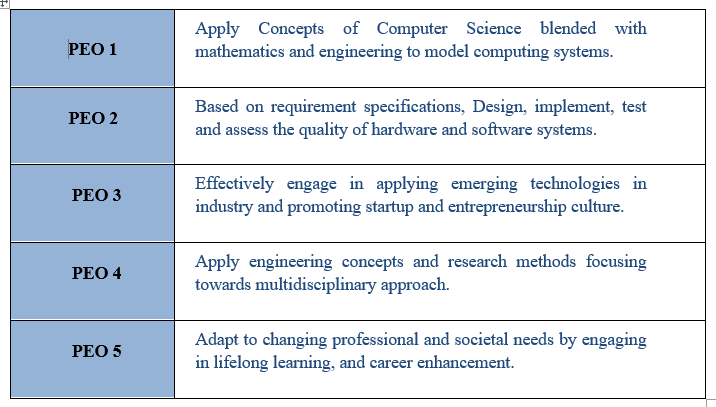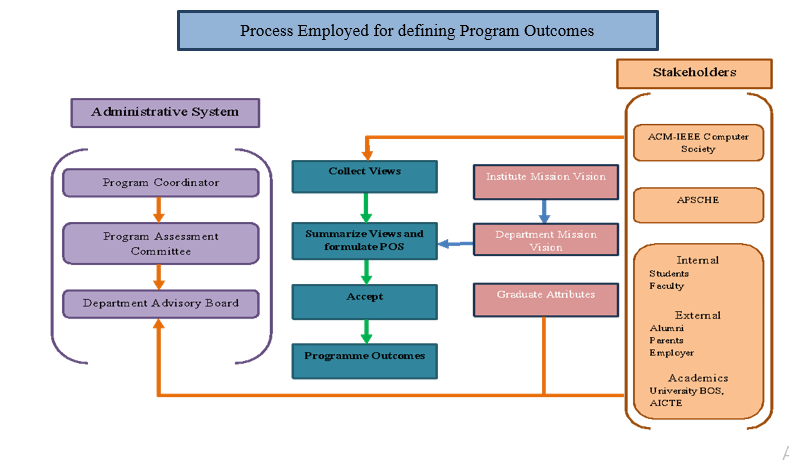
- DEPARTMENT OF COMPUTER SCIENCE AND SYSTEMS ENGINEERING
- COLLEGE OF ENGINEERING
- ANDHRA UNIVERSITY
Vision:
To Facilitate Transformation of Students into Good Human Beings, Competent Professionals, focusing on Assimilation, Generation and Dissemination of Knowledge in the field of Information Technology.
Mission:
Imparting quality education through well-designed curriculum in tune with the challenging needs of the industry and to develop innovative and ethical IT professionals fit for globally competitive environment
Carry out Research and Development in Information technologies and in leveraging IT to serve the societal needs.
Developing effective interactions among faculty and student and foster networking with alumni, industries for mutual benefit.
PROFILE
The Department of Computer Science and Systems Engineering was formed in 1983. The department offers two UG and three PG programs namely B.Tech. (Computer Science and Engineering), 6 Years Integrated Dual Degree B.Tech. + M.Tech. (Computer Science and Engineering), M.Tech. (Computer Science and Technology), M.Tech. (Artificial Intelligence and Machine Learning), M.Tech. (Computer Networks and Information Security) and Ph.D. (Computer Science and Systems Engineering)
The primary focus is on the development of new computational methods and their innovative applications to contemporary problems in science and engineering. Four decades on, the department is a force for innovation, scientific discovery and global impact. It has the state-of-the-art infrastructure and computing equipment supported by high speed networking facility.
Many of the graduating students are leaders in academia, industry and government. Since inception, it has grown in stature to be ranked amongst one of the best in the country. The programmes offered in the department are 3 times NBA accredited and the most recent is for 6 years. The primary goal of the department is to provide the best computing infrastructure, world class learning & research environment, adopt industry practices and to inculcate moral and ethical values in the student fraternity
Computer Science and Systems Engineering department promotes student future-centric education and performs cutting-edge research. It continuously endeavors to create and sustain an academic environment conducive to the highest level of research and teaching. The goal is to develop human resources with sound knowledge of theoretical, systems and application aspects of computer science and systems engineering. Academia-industry collaborations and societal outreach activities are also in place.
The faculty have expertise in computer networks and cyber security, computer architecture and design, algorithms and analysis, artificial intelligence and machine learning, data analytics and natural language processing, cloud computing and internet of things(IOT), vision and image processing, software engineering and block chain technologies
Academic partnership Programme with "Blekinge Institute of Technology", Sweden at the UG level. It has helped many students excel in software engineering specialization. To fill the gap between industry and academia the department faculty actively collaborate with several Industry/R&D institutions like Center for Artificial Intelligence & Robotics, Bangalore, Tech Mahindra Ltd, IBM Visakhapatnam, Business Analytics Ltd, Visakhapatnam, Brain-O-Vision, Hyderabad, Maritime University Visakhapatnam, Naval Science & Technological Lab, Visakhapatnam, National Jiao Tong University, China for research and consultancy
NAAC Presentation
Programs
| Sl.No | Program Code | Name of the Program | ||
|---|---|---|---|---|
| UG Programmes | ||||
| 1 | 3-1-10 | B.Tech. (Computer Science and Engineering) | ||
| 2 | 3-5-8 | B. Tech. + M.Tech.(Computer Science and Engineering -- 6 years Integrated Dual Degree) | ||
| PG Programmes | ||||
| 1 | 3-2-15 | M.Tech. Artificial Intelligence and Machine Learning | ||
| 2 | 3-2-17 | M.Tech. Computer Science & Technology | ||
| 3 | 3-2-18 | M.Tech. Computer Networks and Information Security | ||
| Doctoral Programmes | ||||
| 1 | 04 | Ph.D. - Computer Science and Systems Engineering | ||
Programme Educational Objectives (PEOs)

Programme Outcomes (POs)
- PO1: Able to apply knowledge of computing, mathematics, & engineering principles.
- PO2: Able to identify, formulate, and solve complex computer science & engineering problems.
- PO3: Able to design, implement, and evaluate a computer-based system, component, process or program to meet desired needs with appropriate considerations such as economic / environmental.
- PO4: Able to design and conduct experiments, as well as to analyze and interpret data in computer science & engineering.
- PO5: Able to use the techniques, skills, and modern engineering & computational tools necessary for computer science & engineering practices.
- PO6: Understand the impact of contextual knowledge on social and cultural issues.
- PO7: Understand contemporary issues related to social & environmental context for sustainable development of engineering solutions.
- PO8: Understand professional & ethical responsibility.
- PO9: Able to function effectively as an individual, as a member or leader in diverse & multidisciplinary teams.
- PO10: Able to communicate effectively with teams.
- PO11: Understand engineering & management principles to manage projects.
- PO12: Recognize the need for, with an ability to engage in lifelong learning.

Programme Specific Outcomes (PSOS)
